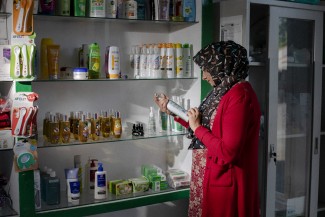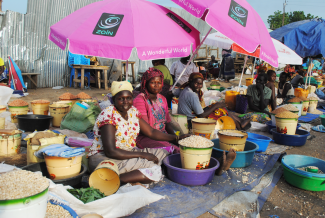KEY RESULTS
- Mango export volumes have increased by more than 60% between 2015 and 2021, following EIF support by way of trainings, better equipment and improved standards.
- Boutik221, an e-commerce platform developed through EIF support, now includes more than 600 businesses, enabling businesses across the country to branch into the digital economy.
- Increased trust in Senegalese products has been enabled through improved and more accessible metrology practices, including the innovative mobile standards truck that assists remote businesses in certifying their products.
- Increased capacity has been built in the Ministry of Trade to mobilize resources, including more than USD 3 million from the national budget for a cashew nut value chain project implemented by the EIF National Implementation Unit (NIU).
Senegal is a relatively stable West African country bordered by Mali, Mauritania, Guinea Bissau and Guinea. 60% of its population of 16.7 million is young (under 35 years old) and predominantly urban. Senegal is known as the "Gateway to Africa" due to its location at the most western point of the continent, an intersection of major maritime and aerial routes.
Senegal’s lower middle-income economy is characterized by a Gross Domestic Product of USD 27.68 billion and a per capita Gross National Income of USD 1,599 (2022). Mining, construction, tourism, fishing and agriculture are prime drivers of the economy. After recording negative growth due to COVID-19, Senegal recorded economic growth of 6.5% in 2021, followed by a decline to 4.2% in 2022 due to adverse climate effects, a reduction in investments and a global economic downturn due to the Ukraine war. In 2021, Senegal met two of the three LDC graduation criteria, human per capita and human assets, and is due for reassessment in 2024.
The Enhanced Integrated Framework (EIF)'s support in Senegal focused on five key areas: better integration of trade into national development strategies; strengthening of institutional capacities in the public and private sectors; improvement of the business environment; development of agricultural value chains, mainly in the mango and cashew nut sectors; and development e-commerce capability.
Enhancing the competitiveness of the Senegalese mango
The EIF has contributed to Senegal’s success story in the mango sector, with the country now being one of the leading growers of mangoes in the West African region. The country increased its production of mangoes from 135,000 tonnes in 2015 to 150,000 tonnes in 2018 with EIF support. Additionally, 2,291 people (of whom 60% are women) and 111 micro-, small- and medium-sized enterprises were trained on good agricultural practices, improved production across the mango value chain, and marketing. Mango storage capacities were also improved. For example, FELTIPLEX, a packaging center, has been strengthened through the acquisition of new equipment and the construction of a modern cold room to increase mango storage capacity and enable mango exporters to meet international export standards.
Productivity and volumes of exports have substantially increased, says Mouhamadou Moustapha Thioub, an Economist and Trade Policy Expert in the NIU:
Another remarkable success in the mango sector between 2015 and 2017 was a 12% increase in gross operating income for producers (from about USD 1,000 to USD 1,400) and a 2.7% increase for profitable processors (from about USD 9,500 to USD 9,700) in the same time period. These achievements are attributed to EIF support provided to 30 mango companies to help them both access international markets and source raw materials. This resulted in 83% of processors sourcing their raw materials from partner producers, compared with 25% at the start of the project.
Mamour Gueye, president of the Mango Invocation Platform and vice president of the Interprofession of Mango Actors in Senegal, shared examples of growth in this sector:
Further support to the sector focused on preventing phytosanitary problems in the export of mangoes, while a semi-industrial mango pulp production unit was built and equipped in Bignona at a total cost of over USD 815,000, with a processing capacity of 6 tons per day.
Supporting the cashew nut industry
To further support Senegal’s economic diversification efforts, the EIF funded the preparation and formulation of the Senegalese Cashew Nut Competitiveness Support Project (PACAS) project, which aimed to increase the productivity of cashew nut producers and boost the exportable supply of quality processed products. The Government of Senegal invested about USD 3 million over a 3-year period (2022-2024) for its implementation. This funding from the Government was a strong demonstration of its commitment towards local ownership, sustainability and strengthening of the NIU to leverage national funding.
Together with the Senegalese Cashew Trade Association as a key implementation partner, the EIF/NIU project has recorded several positive outcomes: 602 actors (producers, processors, traders) were trained and assisted with equipment worth more than USD 115,000.
Institutional capacity-building
The success of the activities articulated above was underpinned by effective structures supported by the EIF. Since 2015, the EIF supported the Ministry of Trade and related institutions to effectively integrate into the international trading system. The establishment of the NIU was key in ensuring that support to the Ministry of Trade was effectively channelled to address the country’s priorities, particularly as they relate to facilitating trade integration within the country’s socio-economic development strategies and plans. According to Thioub, "the NIU is now a facility that independently monitors projects and trade mainstreaming initiatives, sources financing for trade development strategies and actions, and collaborates with other sectors towards the diversification of trade."
The EIF-funded update of the Diagnostic Trade Integration Study (DTIS) to integrate and align emerging development needs led to the development of a Trade Integration Strategy. The development of an action plan on trade integration in the implementation of the Emerging Senegal Plan has guided Senegal's trade actions and policies towards growth through trade. Significantly, the combination of Aid for Trade (AfT) initiatives and the enhanced coordination of donor-related technical assistance in trade has effectively bolstered Senegal's capacity to tackle the priorities outlined in the DTIS. Tangible results have emerged in resource mobilization thanks to the improvement in institutional capacity.
In 2015, the EIF also supported the development of the 2016-2020 policy for the fishing and aquaculture sector. According to 2021 research conducted by Idrissa Diedhiou from the Senegal Institute of Agricultural Research, in 2016, the fisheries sector contributed about 15% of the value of the country’s export earnings, with the sector employing more than half a million people, 30% of whom were women. The policies in this sector are contributing to economic growth, although more needs to be done to conserve fish resources. While supporting Senegal’s Ministry of Trade to update its Sectoral Development Policy (2018-2022), the EIF also provided targeted training to several public and private actors.
E-commerce platform taking Senegal to the world
Economies globally are using information communication technologies (ICT) to drive economic growth. African countries like Senegal are making sure they don’t get left behind. The prioritization of the digital economy in the Senegal Emerging Plan (Plan Sénégal Emergent) underscores its importance to the State of Senegal. Two strategic documents to guide this sector were developed with support from the EIF: The National Strategy for the Development of the E-Commerce in Senegal, and the National Strategy for the Development and Promotion of Services Exports from Senegal.
To harness opportunities offered by the country’s vibrant ICT sector, the EIF supported the establishment of an e-commerce platform that is driving a digitally sensitive trading environment in Senegal. Almost two years ago, the Ministry of Commerce, via the EIF/NIU, launched a national e-commerce platform (www.boutik221.sn). This platform now allows small- to medium-scale businesses to create online stores that can reach both national and international markets.
The idea of the platform was to "help businesses reach consumers in all major urban centers, especially beyond Dakar, where current e-commerce services are concentrated", said Ibrahima Diagne, Chief Executive Officer of Gainde2000, the company that technically helped create the platform. A total of 146 youths were trained in e-commerce as part of a partnership with Cheikh Hamidou KANE Digital University’s "Force N" programme. Senegal fast-tracked the implementation of the e-commerce platform to provide access to essential services during COVID-19. By 30 June 2023, 1,462 businesses were registered with the platform, of which 40% – 585 – belong to women.
Metrology – Improving export product quality
In its efforts to enhance the quality and standard of Senegal's export products, the EIF financed the development of Senegal's metrological capacity. This project specifically addressed a DTIS recommendation to strengthen the national quality testing infrastructure. The national reference structure for metrology was established to facilitate fair trade by enabling harmonized documentary standards that are also aligned with international standards.
Through this project, the EIF supported the refurbishment of three specialized laboratories and the acquisition of new state-of-the-art equipment for mass, temperature and pressure, including a mobile truck that enables remote businesses to certify their products. The equipment and the mobile truck have extended the geographical coverage of metrology services and increased the credibility of businesses.
Key achievements include the training of over 100 laboratory technicians in mass metrology and the expansion of service offerings and regional coverage, turning the supported labs into regional benchmarks. For instance, the LAME laboratory – one of the project's beneficiaries - expanded its metrological services beyond Senegal to include Guinea and Burkina Faso. The project also enabled 103 companies to obtain Manufacturing and Marketing Authorizations and barcode certifications, boosting their trading capacities and opening up new market opportunities. Additionally, it supported the updating of legislative and regulatory texts governing metrology, ensuring compliance with both regional and international standards.
Building sustainability
The EIF’s goal has been to support Senegal in using trade and investment to integrate into global trade in a way that contributes to poverty reduction and sustainable development. The collaboration has focused on improving the business environment to be conducive to inclusive and sustainable growth. Technical and financial support has been provided to support the implementation of the African Continental Free Trade Area national strategy and to support the National Committee of International Trade Negotiations.
All these EIF-supported efforts have resulted in better integration of trade into national development strategies; strengthening of institutional capacities in the public and private sectors; improvement of the business environment; development of agricultural value chains mainly in the mango and cashew nut sectors; and the development of evidence-based policies and regulatory frameworks for fishing, agriculture, services and e-commerce. Local ownership of projects initiated by the EIF is strong, as demonstrated by the joint financing and implementation of projects and the investments in infrastructure by the Government of Senegal.
If you would like to reuse any material published here, please let us know by sending an email to EIF Communications: eifcommunications@wto.org.


